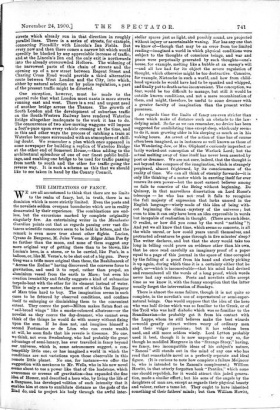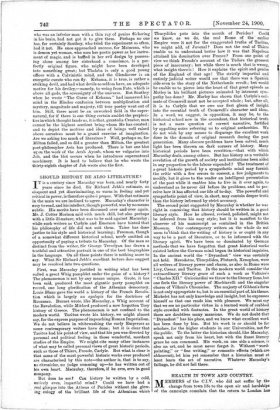THE LIMITATIONS OF FANCY.
WE are all accustomed to think that there are no limits to the realm of fancy, but, in truth, there is no dominion which is more strictly limited. Even the poets and the novelists seldom overpass boundaries which are in reality demarcated by their experience. The combinations are end- less, but the excursions marked by complete originality singularly few. An entertaining writer in the Manchester Guardian points out that as regards passing over vast dis- tances scientific romancers seem to be held in fetters,.and the remark is even more true about other flights. Lucian, Cyrano de Bergerac, M. Jules Verne, or Edgar Allan Poe fly no farther than the moon, and none of them suggest any more original way of getting there than to be blown, like Lucian's hero, in a storm, or to be carried, like Poe's, in a balloon, or, like M. Verne's, to be shot out of a big gun. Percy Greg was a trifle more original than these, the Bashibazouk of "Across the Zodiac" having discovered the converse force to gravitation, and used it to repel, rather than propel, an aluminium vessel from the earth to Mars ; but even his creation irresistibly and fatally suggests a kind of submarine torpedo-boat with the ether for its element instead of water. This is only a new motor, the secret of which the Emperor of Mars tries hard to buy. The imagination seems in such cases to be fettered by observed conditions, and confines itself to enlarging or diminishing them to the convenient extent. They coerce the poet—Milton makes Satan float on "sail-broad wings" like a smoke-coloured albatross—or the novelist as they coerce the day-dreamer, who cannot even think of the things he would do with money without fixing upon the sum. If he does not, and imagines himself a second Fortunatus or de Leon who can create wealth at will, he soon finds that his reverie is tiresome. No one, we think, not even Swedenborg, who had probably the great advantage of semi-lunacy, has ever travelled in fancy beyond our _ universe, which is, some astronomers suggest, a con- temptibly little one; or has imagined a world in which the conditions are not variations upon those observable in this remote little planet. No one, for instance—we offer the suggestion with meekness to Mr. Wells, who in his new novel seems about to use a power like that of the loadstone, which overcomes or screens off gravitation—has expanded the fine idea of Homer, and described a hero who, by living the life of I Snnyasee, has developed volition of such intensity that it enables him at once to annihilate distance as the gods of the Iliad do, and to project his body through the awful inter- stellar spaces just as light, and possibly sound, are projected without injury or ascertainable waning. Nor has any one that we know of—though that may be an error from too limited reading—imagined a world in which physical conditions were subject to the thoughts of conscious beings, and war and peace were perpetually generated by such thoughts—one's house, for example, melting like a bubble at an enemy's will —and all law had for its object the severe regulation of thought, which otherwise might be too destructive. Conceive, for example, Nietzsche in such a world, and how from child- hood upwards he would have had to be spanked and whipped, and finally put to death as too inconvenient. The conception, we fear, would be too difficult to manage, but still it would be outside known conditions, and not a mere recombination of them, and might, therefore, be useful to some dreamer with a greater faculty of imagination than the present writer possesses.
As regards time the limits of fancy are even stricter than those which make of distance such an obstacle to the law. defying mind. So far as we can remember, no device has been suggested for annihilating time except sleep, which only seems to do it, man growing older in his sleeping as much as in his waking hours. An arrest of the action of time has of course often been imagined, as in instances so well known as those of the Wandering Jew, or Mrs. Oliphant's curiously imperfect or lazily worked-out conception of the Warlock Lord; but the actual melting away of time itself has never been asserted by poet or dreamer. We are not sure, indeed, that the thought is not beyond the compass of the imagination, which is strangely perplexed, almost frightened, by its consciousness of the reality of time. We can all think of eternity forwards—it is only like thinking of a motor which in exerting itself for ever renews its own power—but the most earnest believer among us fails to conceive of the Being without beginning. .De Quincey, in that marvellous dissertation on Lord Bosses telescope — he who has not read it fails to recognise the full majesty of expression that lurks unused in the English language—wisely made of this idea of being with- out beginning the climax - mystery of the universe ; but even to him it can only have been an idea expressible in words but incapable of realisation in thought. (There are such ideas, 0 realist, or how did you come by the word " nothing " ?) And yet we all know that time, which seems so concrete, is all the while unreal, or how could years unroll themselves, and protracted adventures be gone through in five minutes' sleep ? The writer declares, and but that the story would take too long in telling could prove on evidence other than his own, that he once read carefully an imaginary proof of a paper equal to a page of this journal in the space of time occupied by the falling of a proof from his hand and slowly picking it up again, during which time it is a certainty either that he slept, or—which is inconceivable—that his mind had devised and remembered all the words of a long proof, which words never had any existence. Poets and novelists alike accept time as we know it, with the funny exception that the latter usually forget the intervention of Sundays.
There is almost the same failure, though it is not quite so complete, in the novelist's use of supernatural or semi-super- natural beings. One would suppose that the idea of the hero who was half divine which was so familiar to the Greek, or of the Troll who was half diabolic which was so familiar to the Scandinavian—he probably got it from his contact with the Lapps, whom he still believes make the best wizards —would greatly attract writers weary of ordinary men and their vulgar passions ; but it has seldom been used, and still more seldom wisely. Lord Lytton probably used it best, though it is now unpopular to say so, for though be muddled Margrave in the "Strange Story," having, we fancy, two incompatible ideas of his subject's nature, " Zanoni" still stands out in the mind of any one who has read that remarkable novel as a perfectly separate and ideal figure. (It is curious to note how complete a failure Meijnour is, who is intended to be Zanoni's complement.) William Howitt, in that utterly forgotten book " Pantika," which some one should republish, for it would attract this jaded genera- tion, made a similar effort ; but his sons of the angels by the daughters of man are, except as regards their physical beauty and valour, rather a tame lot. They ought to have inherited something of their fathers' minds; but then William Howitt, who was an inferior man with a thin ray of genius flickering in his brain, had not got it to give them. Perhaps no one has, for certainly Southey, who tried the experiment so often, had it not. He once approached success, for Maimuna, who is demon yet woman, who uses her poetic power as her instru- ment of magic, and is baffled in her evil design by possess- ing alone among her sisterhood a conscience, is a per- fectly original figure, who might have been developed into something great; but Thalaba is only a good young officer with a Calvinistic mind, and the Glendoveer is an energetic curate who can fly. Xehama, it is true, is rather a
• striking devil, and had what devils so seldom have, an adequate motive for his devilry,—namely, to wring from Fate, which is above all gods, the sovereignty of the universe. But Southey when he wrote "The Curse of Xehama," had immersed his mind in the Hindoo confusion between multiplication and mystery, magnitude and majesty, till true poetry went out of him. Still, there must be an unworked field in the super- natural, for if there is one thing certain amidst the perplexi- ties inwhich thought lands us, it is that, granted a Creator, man cannot be the highest sentient being whom He has created ; and to depict the motives and ideas of beings well raised above ourselves must be a grand exercise of imagination. Are we asking too much of literature ? Well, perhaps so, for Milton failed, and so did a greater than Milton, the greatest poet-philosopher Asia has produced. There is but one blot upon the work of the Arab Ayoub, whom we vulgarise into Job, and the blot occurs when he introduces supernatural machinery. It is hard to believe that he who wrote the thirty-eighth chapter of Job wrote also the first.











































 Previous page
Previous page